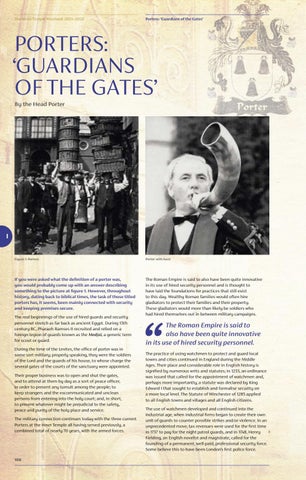The Inner Temple Yearbook 2021–2022
Porters: ‘Guardians of the Gates’
PORTERS: ‘GUARDIANS OF THE GATES’ By the Head Porter
I Figure 1: Porters
Porter with horn
If you were asked what the definition of a porter was, you would probably come up with an answer describing something to the picture at figure 1. However, throughout history, dating back to biblical times, the task of those titled porters has, it seems, been mainly connected with security and keeping premises secure.
The Roman Empire is said to also have been quite innovative in its use of hired security personnel and is thought to have laid the foundations for practices that still exist to this day. Wealthy Roman families would often hire gladiators to protect their families and their property. These gladiators would more than likely be soldiers who had hired themselves out in between military campaigns.
The real beginnings of the use of hired guards and security personnel stretch as far back as ancient Egypt. During 13th century BC, Pharaoh Ramses II recruited and relied on a foreign legion of guards known as the Medjai, a generic term for scout or guard. During the time of the Levites, the office of porter was in some sort military; properly speaking, they were the soldiers of the Lord and the guards of his house, to whose charge the several gates of the courts of the sanctuary were appointed. Their proper business was to open and shut the gates, and to attend at them by day as a sort of peace officer, in order to prevent any tumult among the people; to keep strangers and the excommunicated and unclean persons from entering into the holy court; and, in short, to prevent whatever might be prejudicial to the safety, peace and purity of the holy place and service. The military connection continues today with the three current Porters at the Inner Temple all having served previously, a combined total of nearly 70 years, with the armed forces.
108
The Roman Empire is said to also have been quite innovative in its use of hired security personnel. The practice of using watchmen to protect and guard local towns and cities continued in England during the Middle Ages. Their place and considerable role in English history is signified by numerous writs and statutes; in 1233, an ordinance was issued that called for the appointment of watchmen and, perhaps more importantly, a statute was declared by King Edward I that sought to establish and formalise security on a more local level. The Statute of Winchester of 1285 applied to all English towns and villages and all English citizens. The use of watchmen developed and continued into the industrial age, when industrial firms began to create their own unit of guards to counter possible strikes and/or violence. In an unprecedented move, tax revenues were used for the first time in 1737 to pay for the night patrol guards, and in 1748, Henry Fielding, an English novelist and magistrate, called for the founding of a permanent, well-paid, professional security force. Some believe this to have been London’s first police force.
